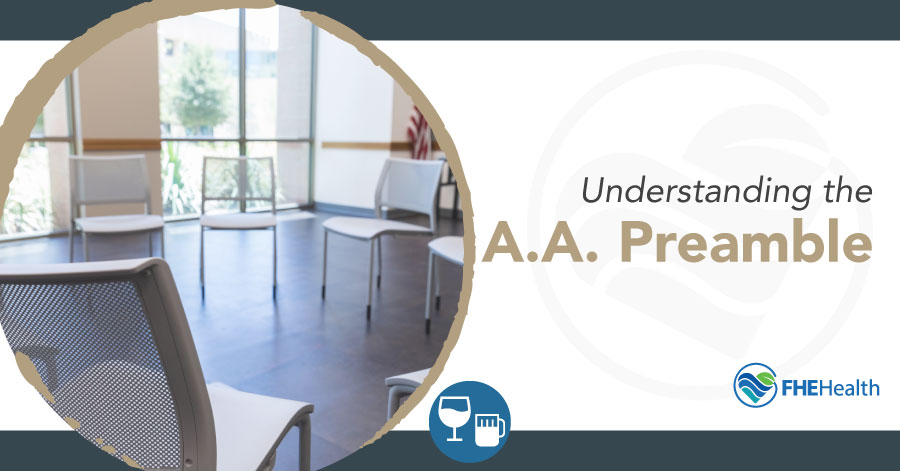
Updated on 01/27/2025
Alcoholics Anonymous has had a large presence in recovery communities since it was founded in 1935. One of the main reasons is that group meetings are standardized and consistent. No matter where you go, every meeting is run using the same guidelines, and every meeting starts the same way: a moment of silence, the Serenity Prayer and the AA preamble.
Most people in group meetings don’t necessarily take the time to internalize every word of the AA preamble every time they hear it or recite it. However, that doesn’t mean it doesn’t have an impact.
The AA Preamble’s importance is something many people overlook. An AA member can attend a meeting in any city, and it will follow the same format, with the preamble being read at the start. It may seem like just a quick introduction for new members, but it has a much more important purpose.
The AA Preamble’s Importance In Recovery
The significance of the Alcoholics Anonymous preamble is something that should be familiar to anyone who’s attended a meeting at one of the organization’s more than 120,000 groups across the world. It’s used as a welcome, an introduction and a reminder that everyone who attends AA, whatever stage they’re at in their recovery, is a part of a bigger group. At AA, they’re among friends who understand their struggles.
In this piece, we’ll break down the AA preamble and talk about how it shapes the foundation of AA meetings — and meetings of other 12-step groups — and unites people in recovery.
What Is the AA Preamble?
The AA preamble ensures that everyone who attends AA meetings can understand the expectations of their attendance. But this two-paragraph creed plays a larger role than purely a description of AA.
It reads as follows:
Alcoholics Anonymous is a fellowship of men and women who share their experience, strength and hope with each other that they may solve their common problem and help others to recover from alcoholism.
The only requirement for membership is a desire to stop drinking. There are no dues or fees for AA membership; we are self-supporting through our own contributions. AA is not allied with any sect, denomination, politics, organization or institution; does not wish to engage in any controversy, neither endorses nor opposes any causes. Our primary purpose is to stay sober and help other alcoholics to achieve sobriety.”
Here’s a section-by-section breakdown of the AA preamble that illustrates its higher purpose and impact on those in recovery.
Part 1 of the AA Preamble
It Defines and Governs the Community of Members
The preamble opens by explaining what AA is and that members “share their experience, strength and hope with each other that they may solve their common problem and help others to recover from alcoholism.” This is central to the significance of the Alcoholics Anonymous preamble. Members sharing their stories helps both the listener and the one doing the sharing on the road to recovery.
Some individuals recovering from alcoholism find it hard to admit their difficulties. The preamble reminds them that sharing their struggles is a mutually beneficial part of the recovery journey.
This is different from the many in-group sayings and points of etiquette you’re likely to hear during meetings. It focuses on reminding members that AA meetings revolve around sharing your experiences.
This is important for a few reasons. First, AA encourages people to have an open mind and communicate via sharing experiences rather than giving lectures. People struggling with addiction are more likely to take what another person says to heart if it’s part of a shared experience.
This denial of outside help is one of the main barriers people (especially men) face when the prospect of getting help is brought up, and AA meetings aim to make sure members are in a place where they’re willing to accept help and advice.
It also sets an expectation that if you attend a meeting, you should share — or that you’ll get the most benefit out of sharing your own story. Sharing is a way to release a lot of pent-up emotions, stress and frustration, but you should share for more than just your own benefit. When you tell your story in an AA group, you never know who’s going to be helped by hearing it.
It Defines the Purpose and Goals of AA
The AA preamble serves as a mission statement for every meeting and the identity of the group as a whole. It continues, “share their experience, strength and hope with each other that they may solve their common problem and help others to recover from alcoholism.”
This clearly states the mission of every meeting: to serve a collective goal of helping members recover from their struggles with alcoholism.
This hints at one of the core values of AA: You’re never alone. As many veterans of AA will tell you, “working the 12 Steps” isn’t something easily accomplished without the help of a sponsor and a support system. As such, the preamble provides the basis for a group that leans heavily on fellowship as a driver for self-improvement.
Part 2 of the AA Preamble
It Welcomes New Members, Regardless of Background
The second part of the AA preamble starts, “The only requirement for membership is a desire to stop drinking.” This means the most valuable aspect of the 12 steps of AA is the willingness to take the first one.
The preamble goes on to explain the 12 traditions of Alcoholics Anonymous and highlights the nature of the organization, in particular, that “there are no dues or fees for AA membership” and that “AA is not allied with any sect, denomination, politics, organization or institution.”
The second paragraph of the preamble is a statement about the openness of the organization. Addiction doesn’t discriminate, and a core value of AA is that it doesn’t either.
These factors are something that greatly helps AA play such a large role in the recovery community. Anyone can join, regardless of their income. The organization is apolitical, and members of varying political and religious beliefs can leave those at the door and be bound together by the core purpose and meaning of the AA preamble: to work together on the path to recovery.
This kind of openness helps new members feel welcome, whether they’re new to a specific group in a certain location or new to Alcoholics Anonymous in general.
What Should We Take Away From the AA Preamble?
Understanding the AA preamble means putting it all together. When we look at it as a whole, the importance of AA to people in recovery becomes clearer. It’s a group, open to everyone, that focuses on fellowship and shared experiences to serve the common and collective goal of recovery from addiction.
Because it’s recited at the beginning of every meeting, the preamble of AA serves as a reminder to members — whether it’s acknowledged every time or not — of their commitment to their own journey and to their peers.
12-Step Integration at FHE Health
We offer 12-step programs as part of our recovery curriculum because we’ve seen the value that groups like AA can offer to people in recovery.
It provides structure that people need in their lives when they have a history of abusing drugs and alcohol. It ensures rehab alumni that no matter where their life takes them, they’re never far away from a familiar type of meeting — a place that feels like home, regardless of their history or situation.
If you’re concerned about your relationship with alcohol, you don’t have to struggle alone. Contact us today for confidential advice from our compassionate team of addiction specialists.









